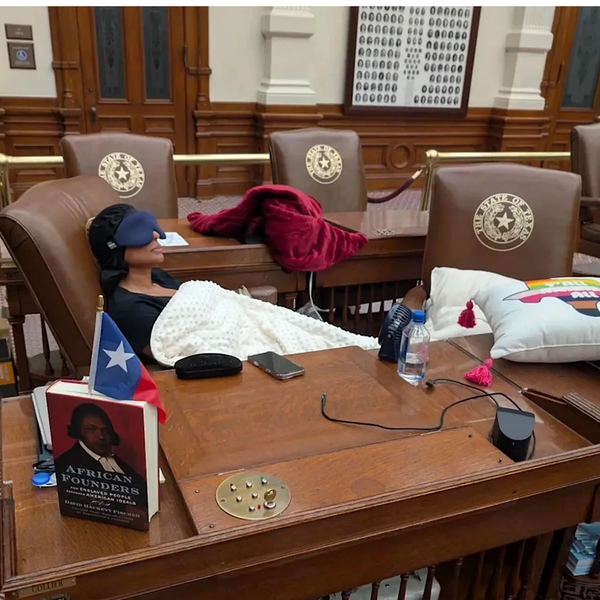Why Nonpartisan Analysts Believe Democrats May Hold The House -- Really

Pro-choice demonstrators at the US Supreme Court in Washington, D.C.
The New York Times' Nate Cohn finally wrote a column this week admitting that people shouldn't flatly dismiss Democrats' chances of keeping the House.
It wasn't a ringing endorsement by any means. Republicans are still favored to pick up the five seats they need to reclaim control of the lower chamber. But Democrats prevailing, Cohn added, "is a real possibility — not some abstraction in the sense that anything can happen."
Perhaps the most notable nugget from the piece was the admission that analysts are somewhat flying blind where the House is concerned, because so little polling is available.
I asked my friend Dave Wasserman, House editor of the Cook Political Report, whether he thought Democrats would appear to lead in the race for the House today if there were robust polling averages in every district, as there are in the Senate. He said they would, with Democrats leading the polls “in maybe 220 to 225 seats,” more than the 218 needed for a majority.
So while the House ratings aren't exactly a crapshoot, they're also the product of a lot of well-informed guesswork. As the election draws nearer, forecasters continue to revise their predictions based on how the cycle is evolving.
For Democrats, that forecast continues to improve. On Wednesday, Cook Political moved seven of 10 ratings changes in the direction of Democrats.
NEW at @CookPolitical: 10 House rating changes, including seven in Dems’ direction and three in GOP’s direction. Full analysis: https://t.co/5dgUidrlfa pic.twitter.com/4v9JVzPxGT
— Dave Wasserman (@Redistrict) October 5, 2022
The latest change was just one of several adjustments over the past several months in the direction of Democrats. In July, Cook was predicting a GOP pickup of 20 to 35 seats. Now, the outlet is framing the "likeliest outcome" as a 5- to 20-seat gain for Republicans.
That's the good news. Unfortunately, Cook rates 211 seats lean/likely/solid Republican and only 194 seats as lean/likely/solid Democratic. That means of the 30 seats rated as "toss ups," Republicans only need to win 7 of them to take the majority, whereas Democrats need to win 24 to maintain House control.
But again, those ratings aren't rooted in an abundance of polling.
Another way to look at it is that, while FiveThirtyEight.com favors Democrats to keep the Senate and Republicans to take the House, there's about a six-in-10 chance that one party will end up controlling both chambers.
By and large, Democrats are hanging in there in a cycle where, historically speaking, they wouldn't have a chance. And although some key races are tightening in the Senate (most of which are in GOP-held seats), the overall environment is still generally improving for Democrats.
President Joe Biden's job approval has hit its highest point in over a year in both Civiqs tracking and FiveThirtyEight's likely/registered voter aggregate.
In the generic ballot, Democrats have gained in four of the last five weekly tracking polls at FiveThirtyEight, as New Democrat Network president Simon Rosenberg noted.
Reuters/Ipsos, polling all adults (rather than likely voters or registered voters) showed Democrats backsliding by four points to a 33 percent -- 32 percent advantage.
However, the other four weekly tracking polls saw a net shift toward Democrats over the past week.
- Economist/YouGov (LV): 46Ds-47Rs —>> 47Ds-46Rs; Net change: Dems +2
- Politico/Morning Consult (RV): 45Ds-43Rs —>> 46Ds-43Rs; Net change: Dems +1
- Morning Consult (LV): 48Ds-44Rs —>> 49Ds-44Rs, Dems +1
- Rasmussen/Pulse Opinion (LV): 42Ds-44Rs —>> 44Ds-45Rs; Net change: Dems +1
For several weeks, Democrats have also been expressing more enthusiasm than Republicans about voting.
NEW: Congressional Democrats are seeing their widest lead on the generic ballot among LIKELY voters since tracking began in August.
— Eli Yokley (@eyokley) October 4, 2022
And for the third week in a row, Dems are more likely than Republicans to express a high level of enthusiasm about voting. https://t.co/8boV69VW2N pic.twitter.com/TZDBS9e6Sj
At this point, the most anyone can really say with any certainty is that Democrats are outperforming expectations, defying historic trends, and this midterm contest remains extremely competitive. That has proven true in both the polling and the four special elections since the Supreme Court overturned abortion rights, plus the Kansas ballot measure banning abortion.
Regardless of whether Democrats sweep, split, or lose both chambers, the results will leave them in much better shape after Election Day than anyone originally thought possible.
The only question we should be asking ourselves at this point is: What can we do to help deliver a historic blow to Republicans?
Reprinted with permission from Daily Kos.
- Bipartisan Commissions Cause Redistricting Pain for Democrats ... ›
- Once unthinkable, Democrats now see narrow path to keeping the ... ›
- Democrats' Departures Narrow Path to Holding the House Majority ... ›
- Deep in the Democrats' Climate Bill, Analysts See More Wins for ... ›
- JCT: Democrats' Proposals Increase Taxes on Millions of Americans ›
- A Year of U.S. Public Opinion on the Coronavirus Pandemic | Pew ... ›








